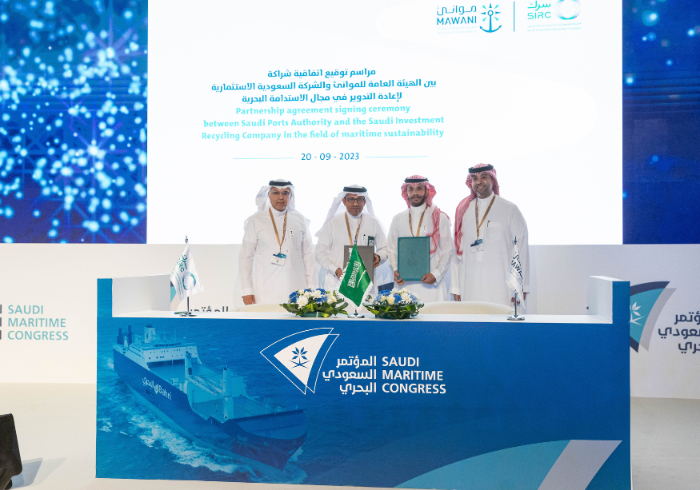The 4th edition of the Saudi Maritime Congress – held under the patronage of the Ministry of Transport and Logistic Services – showcased the immense potential and transformative power of the shipping and logistics sectors in Saudi Arabia and the GCC region. Aligned with the ambitious goals of Saudi Vision 2030, the event served as a catalyst for revolutionizing the maritime industry and driving sustainable growth.

In a global first, two significant MOU (Memorandum of Understanding) deals were signed at Saudi Maritime Congress – the Kingdom’s premier global maritime gathering – which concludes at Dhahran Expo, KSA, today (21st September 2023).

Reinforcing sustainable economy
The first deal was signed between Bahri, a global leader in logistics and transportation, and SAIL, a subsidiary of Saudi Investment Recycling Company (SIRC). The MOU signals a plan to foster collaboration in the field of sustainable shipping and aims to drive environmental stewardship, promote circular economy principles, and advance sustainable practices within the maritime industry.
The collaboration between Bahri and SAIL signifies their shared vision to transform the shipping sector into a more sustainable and eco-friendly industry.
The second signing saw Saudi Ports Authority (MAWANI) and Saudi Investment Recycling Company (SIRC) announce the signing of a partnership agreement aimed at advancing maritime sustainability in the Kingdom of Saudi Arabia. The collaboration marks a significant milestone in driving sustainable development and supporting the Kingdom’s Vision 2030 objectives.
The agreement underscores the shared commitment of SPA and SIRC to foster environmental stewardship, resource efficiency, and the circular economy within the maritime sector.
The two-day congress – featuring founding Strategic Partner Bahri, main partners MAWANI and TGA and Strategic Partners Aramco and IMI – has featured a diverse range of activities, including engaging panel discussions, interactive workshops, and enlightening presentations by industry leaders, experts, and government officials. The invaluable insights shared during these sessions provided attendees with a deeper understanding of emerging trends, disruptive technologies, and best practices in the maritime sector.
Dynamic progress of the maritime and logistics industries
Chris Hayman, Chairman Emeritus, Seatrade Maritime, organizers of the event and who inaugurated the opening ceremony, said: “This is the fourth edition of an event providing a platform to discuss and display the dynamic progress of the maritime and logistics industries of the Kingdom of Saudi Arabia. Through this comprehensive conference programme, we heard much more about the scale and nature of that progress pathway towards the Kingdom’s goal to be a global logistics hub.”
He added, “With a target of quadrupling annual container throughput by 2030 to 40m TEU, the KSA seeks to achieve this by investing in infrastructure, regulatory reform, workforce training and the leveraging of its strategic location. With a 14% rise in container, throughout the first half of this year, the momentum is clearly building.”
The India Middle East Europe Economic Corridor project announced at the G20 summit in India two weeks ago involving Saudi Arabia, the UAE, the US and India, complements the Vision 2030 project. Two separate corridors, the first linking India and the Arabian Gulf, and the second connecting the Arabian Gulf with Europe, will focus on port and rail infrastructure investment alongside a clean energy pipeline and high-speed data cable.
Hayman emphasized, “In the energy sector, Saudi Arabia’s focus on sustainability and its pioneering projects aimed at decarbonising the world’s hydrocarbon energy processes are aligned with its belief that it will take all available sources of energy, both legacy and alternatives, to meet global demand over the next 25 years. The Kingdom’s increasing role as an exporter of refined product, and the strong resurgence in the offshore market was heavily discussed from this platform. Also, as a maritime nation of increasing stature, Saudi Arabia is taking a more active role in global maritime affairs at the IMO and in other international organisations.”
Tackling pathways towards decarbonisation
Saudi Maritime Congress provides one of the first opportunities for the industry to discuss the implications of the new and accelerated pathways towards decarbonisation agreed at the IMO’s MEPC 80 just two months ago. The adoption of the new technologies and the availability of zero carbon fuels needed to meet the new timeline together represent a major challenge for the global industry.
Hayman concluded, “Driven by the exciting development now unfolding here in the Kingdom, the level of support for Saudi Maritime Congress 2023 has grown substantially from last year. With an increase in overall attendance of more than 50% and a greatly expanded exhibition, this event is on track to join the elite group of world class maritime events, matching Saudi Arabia’s growing status as a global maritime hub.”


COMMENTS